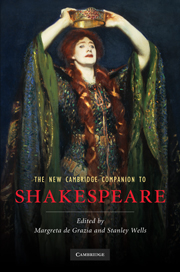Book contents
- Frontmatter
- 1 The traces of Shakespeare’s life
- 2 Shakespeare’s reading
- 3 Shakespeare’s writing: from manuscript to print
- 4 The theatre of Shakespeare’s London
- 5 The transmission of Shakespeare’s texts
- 6 Shakespeare and language
- 7 Shakespeare the poet
- 8 Shakespeare’s comedies
- 9 Shakespeare’s tragedies
- 10 Shakespeare’s English history plays
- 11 Shakespeare’s classical plays
- 12 Shakespeare’s tragicomedies
- 13 Shakespeare, religion and politics
- 14 Shakespeare and race
- 15 Shakespeare, sexuality and gender
- 16 Shakespeare on the stage
- 17 The critical reception of Shakespeare
- 18 Shakespeare and popular culture
- 19 Shakespeare and globalization
- 20 Shakespeare and media history
- 21 Shakespeare: reading on
- Index
21 - Shakespeare: reading on
Published online by Cambridge University Press: 28 January 2011
- Frontmatter
- 1 The traces of Shakespeare’s life
- 2 Shakespeare’s reading
- 3 Shakespeare’s writing: from manuscript to print
- 4 The theatre of Shakespeare’s London
- 5 The transmission of Shakespeare’s texts
- 6 Shakespeare and language
- 7 Shakespeare the poet
- 8 Shakespeare’s comedies
- 9 Shakespeare’s tragedies
- 10 Shakespeare’s English history plays
- 11 Shakespeare’s classical plays
- 12 Shakespeare’s tragicomedies
- 13 Shakespeare, religion and politics
- 14 Shakespeare and race
- 15 Shakespeare, sexuality and gender
- 16 Shakespeare on the stage
- 17 The critical reception of Shakespeare
- 18 Shakespeare and popular culture
- 19 Shakespeare and globalization
- 20 Shakespeare and media history
- 21 Shakespeare: reading on
- Index
Summary
Complete works
It sounds obvious, but the best first step - indeed, the best single Shakespearian investment it's possible to make - is to get hold of a reliable version of the words Shakespeare wrote. A collected edition of the plays and poems should not merely provide a reliable, helpfully annotated set of texts, it should also be honest about the decisions that went into editing. It should contain essential supplementary information as well: an account of Shakespeare's life, background on his linguistic and political contexts, stage history, suggestions about how to approach and interpret the works and tips on what to read next (this chapter has its own thoughts on each of those topics too).
That said, no complete works is perfect; editors argue too much for that. The safest choice remains The Riverside Shakespeare, edited most recently by G. Blakemore Evans (1997), which contains solid historical background, detail on documentary sources and criticism, light glossing on the page and some of the best short essays on the plays still in print. Yet Riverside's presentation of the texts is somewhat old-fashioned, and many prefer to use the more experimental William Shakespeare: The Complete Works, known as the 'Oxford Shakespeare', edited by Stanley Wells and Gary Taylor, which was originally published in 1986, then revised in 2005.
- Type
- Chapter
- Information
- The New Cambridge Companion to Shakespeare , pp. 325 - 342Publisher: Cambridge University PressPrint publication year: 2010

